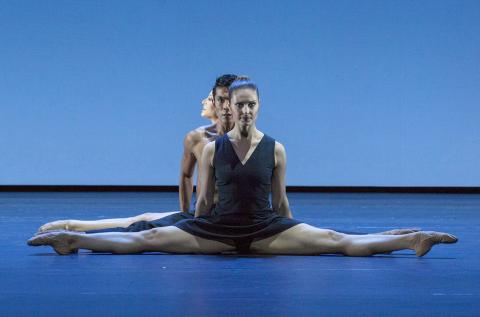There could have been no better program to launch the National Kaohsiung Center for the Arts’s (Weiwuying) portion of the Taiwan International Festival of Arts (TIFA) than the Ballett am Rhein Dusseldorf Duisburg with artistic director Martin Schlapfer’s 7.
Accompanied by the Taipei Symphony Orchestra (台北市立交響樂團) under the baton of Weiwuying artistic director Chien Wen-pin (簡文彬), the troupe gave a dynamic performance, matched by that of the orchestra, that fully merited the repeat curtain calls on Saturday last week.
Audiences in Taiwan have so little opportunity to see a full-length contemporary ballet that such performances can be counted on two hands: Ballet Preljocaj’s Snow White and La Fresque (The Painting on the Wall), Lin Mei-hong’s (林美虹) Schwanengesang (Swan Song) for Tanztheater des Staatstheaters Darmstadt and The Little Mermaid for TANZLIN.Z, the Hong Kong Ballet’s (香港芭蕾舞團) ALICE (in wonderland) or Allen Yu’s (余能盛) works such as Lost Illusion (失落的幻影) and his Tchaikovsky-based ballets. To see one that is completely abstract is rarer still.

Photo courtesy of Gert Weigelt
So there was a feeling of excitement surrounding the Ballett am Rhein’s arrival in Taiwan with Schlapfer’s 2013 ballet 7, set to Gustav Mahler’s Symphony No. 7 in E minor.
Schlapfer had avoided using Mahler’s works for years after being burned by criticism of his 1995 work for the Berner Ballett, Ruckert Songs. It was not until he took over the Ballet Am Rhein in 2009 that turned to the composer again.
It is a very good thing that he did.

Photo courtesy of Gert Weigelt
His 7 is a dramatic, powerful ballet that perfectly plays off Mahler’s sweeping score, thanks to Schlapfer’s musicality.
While there is no story line, the ballet appears to be about human relationships, but one that encompasses the entire gamut from the solitude of singletons, to couples, trios and small groups.
Dancers enter, interact and then depart, sometimes after a rejection, other times of their own volition.
Partners are often swapped, as are the power dynamics between male and female.
The 40-strong company was only on stage together at the end, in a finale that sees them run almost en masse around a circle of stools, a lone woman in the center. It was a fitting climax that matches Mahler’s score.
Florian Etti kept his palate for the set and costume design in shades of black, lightened occasionally with silver, white and a touch of blue. The only stage adornment is a set of large, slightly reflective panels on the sides and back of the stage that rise, lower or divide.
The dancers perform in bare feet, black shoes, sometimes boots and sometimes in pointe shoes for the women. Each option adds another dimension to the dancing.
In different hands, 7 could have been a dark, dispiriting work. With Schlapfer and Chien, it is a visual and aural delight.
It is a rare ballet where men and women are given equally strong roles. The company’s dancers appear to be perfectly matched physically, in technique and articulated lines.
Schlapfer appears to have given almost every dancer a chance for a star turn in 7, be it a solo, in a couple or as part of a group, although it is difficult to be sure without a score card.
That display of equalitarianism is a reflection of how Schlapfer runs the multinational Ballett am Rhein: All the dancers are soloists; there are no principals, no corps de ballet.
However, some dancers did stand out: Sonny Locsin, Chidozie Nzerem, Daniel Smith and Alexandre Simoes among the men, and Virginia Segarra Vidal, Ann-Kathrin Adam, Wun Sze Chan and Doris Becker among the women, to name but a few.
The Ballett am Rhein and the Taipei Symphony Orchestra are now in Taichung, where they will give two performances at National Taichung Theater on Saturday and Sunday afternoons.
Dance fans should run, walk, take the bus, a train or the high-speed rail to Taichung this weekend — Ballett am Rhein’s 7 is a show not to missed.

In the March 9 edition of the Taipei Times a piece by Ninon Godefroy ran with the headine “The quiet, gentle rhythm of Taiwan.” It started with the line “Taiwan is a small, humble place. There is no Eiffel Tower, no pyramids — no singular attraction that draws the world’s attention.” I laughed out loud at that. This was out of no disrespect for the author or the piece, which made some interesting analogies and good points about how both Din Tai Fung’s and Taiwan Semiconductor Manufacturing Co’s (TSMC, 台積電) meticulous attention to detail and quality are not quite up to

April 21 to April 27 Hsieh Er’s (謝娥) political fortunes were rising fast after she got out of jail and joined the Chinese Nationalist Party (KMT) in December 1945. Not only did she hold key positions in various committees, she was elected the only woman on the Taipei City Council and headed to Nanjing in 1946 as the sole Taiwanese female representative to the National Constituent Assembly. With the support of first lady Soong May-ling (宋美齡), she started the Taipei Women’s Association and Taiwan Provincial Women’s Association, where she

Chinese Nationalist Party (KMT) Chairman Eric Chu (朱立倫) hatched a bold plan to charge forward and seize the initiative when he held a protest in front of the Taipei City Prosecutors’ Office. Though risky, because illegal, its success would help tackle at least six problems facing both himself and the KMT. What he did not see coming was Taipei Mayor Chiang Wan-an (將萬安) tripping him up out of the gate. In spite of Chu being the most consequential and successful KMT chairman since the early 2010s — arguably saving the party from financial ruin and restoring its electoral viability —

It is one of the more remarkable facts of Taiwan history that it was never occupied or claimed by any of the numerous kingdoms of southern China — Han or otherwise — that lay just across the water from it. None of their brilliant ministers ever discovered that Taiwan was a “core interest” of the state whose annexation was “inevitable.” As Paul Kua notes in an excellent monograph laying out how the Portuguese gave Taiwan the name “Formosa,” the first Europeans to express an interest in occupying Taiwan were the Spanish. Tonio Andrade in his seminal work, How Taiwan Became Chinese,